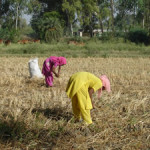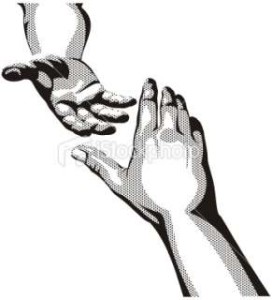Stan gave us a hand up, not a hand out.
I was teaching a group of students about government and taxes.
They had just been to the local welfare office that week. There they learned how much federal and state tax dollars could help people in their city. I asked them to list the questions they had about what they had learned about government assistance. The students excitedly filled a white board. [1]
 When they finished I was honest. “You are starting from the wrong place. We need to begin at the local level, rather than the federal level. Who do you think best knows the needs of the folks where you live, you or politicians in Washington, D.C.?” The chorus of “We do!” rang through the room.
When they finished I was honest. “You are starting from the wrong place. We need to begin at the local level, rather than the federal level. Who do you think best knows the needs of the folks where you live, you or politicians in Washington, D.C.?” The chorus of “We do!” rang through the room.
“If the people who know the needs of the city best are sitting in this room, I suggest we adopt a new view  of welfare.” I drew six concentric circles on the board. From the inside out, I labeled (1) home (2) church (3) neighborhood (4) city (5) state (6) federal.
of welfare.” I drew six concentric circles on the board. From the inside out, I labeled (1) home (2) church (3) neighborhood (4) city (5) state (6) federal.
I am not against government. Nor am I against welfare. My family needed food stamps during my first six years of teaching in a Christian school. What I am against is that our first thought tends to be ‘Why does my neighbor need government aid?’ instead of asking ‘How can I help my neighbor?’
 The class and I then went back to The Bible to find biblical principles of wealth and welfare. I began by explaining the gleaning principle from Leviticus 19:9-10. God gave land owners both benefit from and responsibility for wealth. God told His people to harvest their crops. However, whatever fruit fell to the ground or was on the edges of the field was to be left behind for the poor. Those who had need in the neighborhood could then go into the field to pick up produce.
The class and I then went back to The Bible to find biblical principles of wealth and welfare. I began by explaining the gleaning principle from Leviticus 19:9-10. God gave land owners both benefit from and responsibility for wealth. God told His people to harvest their crops. However, whatever fruit fell to the ground or was on the edges of the field was to be left behind for the poor. Those who had need in the neighborhood could then go into the field to pick up produce.
God was establishing an important principle: the poor need a hand up, not a hand out. “Hand outs” tend to steal from the poor. Initiative and work are taken from those who need it most. Dignity and respect soon follow. If we give a helping hand we better serve people in need. I remember what that was like. I worked hard yet my growing children benefited from government assistance.
But Stan was the man who helped even more. Stan was our landlord for six years, during the  time when we needed help the most. Stan rented us one side of a duplex. Our two bedroom, one bath, 650 square foot apartment was small but met our needs. Stan let us use one side of an attached garage for free; a real boon for our car since we lived in frigid Bismarck, North Dakota. We could wash our clothes for 25 cents and dry them for 10 in a basement laundry room. We paid the monthly low rent of $250 because Stan knew we could not afford anything more. In six years, he never raised the rent. Stan and his wife would take us out to eat on Sundays from time to time, buying gifts for our children at Christmas.
time when we needed help the most. Stan rented us one side of a duplex. Our two bedroom, one bath, 650 square foot apartment was small but met our needs. Stan let us use one side of an attached garage for free; a real boon for our car since we lived in frigid Bismarck, North Dakota. We could wash our clothes for 25 cents and dry them for 10 in a basement laundry room. We paid the monthly low rent of $250 because Stan knew we could not afford anything more. In six years, he never raised the rent. Stan and his wife would take us out to eat on Sundays from time to time, buying gifts for our children at Christmas.
 Stan was a member of our church. Stan lived in our city. Stan was an example of God’s gleaning principle. Stan owned his own company, made a good living, and gave us a hand up for six years. Our friendship with Stan will be renewed in the next life. But Stan’s earthly life sets an example for us all to follow. We do not need money given to us from people we do not know us. We do need to give our money to people whom we know, where we live.
Stan was a member of our church. Stan lived in our city. Stan was an example of God’s gleaning principle. Stan owned his own company, made a good living, and gave us a hand up for six years. Our friendship with Stan will be renewed in the next life. But Stan’s earthly life sets an example for us all to follow. We do not need money given to us from people we do not know us. We do need to give our money to people whom we know, where we live.
Mark believes there are many economic principles resident within The First Testament. Dr. Eckel teaches gleaning and other financial ideals to graduate students at Capital Seminary and Graduate School.
[1] When I hear politicians discuss “economic development” I cringe. To politicians, the phrase “economic development” means they develop with my economics. Like most people I believe I can spend my money better than the government. Taxes, in whatever form they take, can steal from the good things good people can do in their good neighborhoods.


I appreciate this more than you know and am sad for those days that were so hard for you and your family! However, your on-going “love affair” with the Lord about your life and all you have learned from its hardships is a blessing for us all!! You bring HIS Word to life in every context of life!
Scripture in action…love this, it falls right in line with Jesus’ “love your neighbor as yourself” teaching. Thanks for sharing this Dr Mark…